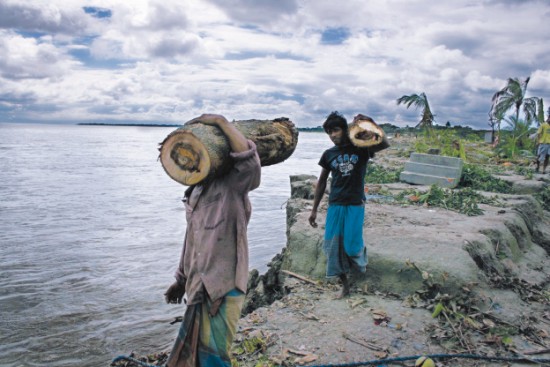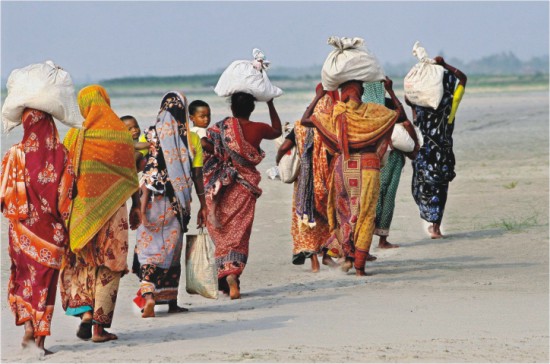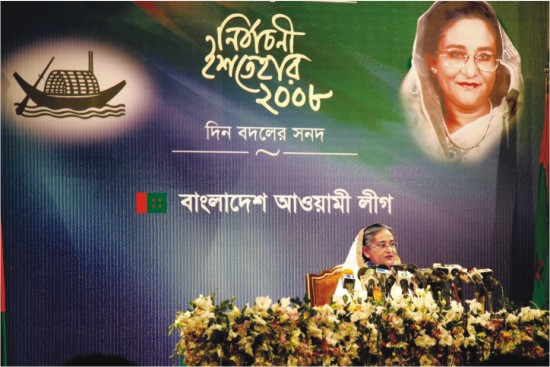
Inside
|
Moving on Up Ahmed A. Azad lays out the path to Bangladesh becoming a middle-income nation within the next decade
In recent months the local media has been inundated with news items and discussions on the adverse effects of global recession and climate change on Bangladesh's economic growth. Various pundits and experts have voiced what needs to be done to climb out of the pool of least developed countries and join the ranks of the middle-income nations. Poverty remains Bangladesh's biggest concern and cannot be alleviated without ensuring food, health, energy, and environmental security. This is a very difficult undertaking in a country with scarce fuel and energy reserves, a very unfavourable people-to-land ratio, and prone to periodic natural disasters. The overall situation is expected to worsen as a result of global warming and climate change, the portents of which are already in evidence. On the positive side, many of the macro-economic indicators for Bangladesh are positive and Bangladesh has made more progress in social welfare. Bangladesh is also one of a small number of countries that have ridden the impact of the international economic recession fairly well mainly on the back of foreign currency reserves generated by the ready made garments (RMG) and manpower export sectors. In comparison to most developing countries, Bangladesh has a proud academic heritage and a small but significant reservoir of highly trained professionals and academics (resident and expatriate) whose expertise could be readily utilised in development activities. Bangladesh can, therefore, be considered to be a prime candidate for elevation to the status of a middle-income nation. So what measures need to be taken to speed this along? The governor of Bangladesh Bank has said that Bangladesh can become a middle-income country (increase of annual per capita income from current $690 to over $1,000) within four years if this year's GDP growth rate of 5.9 per cent is sustained. His strategy for continued economic growth and poverty reduction is to be implemented through selective and easily accessible soft loans to the most affected sections of society. This proposed loan scheme for the economically and socially disadvantaged rural population is to be lauded, but on its own will it be enough to attain middle-income status or sustainable economic development if the required technology and infrastructure is missing? In order to climb out of the LDC pool, Bangladesh's developments efforts need to be multi-pronged but directed primarily to strengthening its rural economy, conserving its environment and bio-diversity, and greatly expanding its export sector into niche areas of existing strength. Bangladesh must also make full and proper use of all the economic concessions allowed to it as a member of the LDC group including intellectual property (patent) holiday it enjoys till 2016. It should lessen its over dependence on the export of RMG and manpower that remain highly vulnerable to the vagaries of the international market and which in essence are based on exploitation of vulnerable sections of society. In addition to these two well established sectors, Bangladesh should diversify and expand its export base through additional initiatives such as rebuilding the traditional manufacturing capacity for jute and jute products, and investing in the manufacture of modern pharmaceuticals an area where it is already internationally competitive and has the potential of becoming Bangladesh's number one export through further investment in research and technology. The government must also build the technological know-how and infrastructure that will allow the development agenda to be locally driven and implemented in areas where most needed. Our policy makers also need to realise and believe that sustainable development is not possible without excellence in technical and higher education and scientific and technological (S&T) proficiency. I will use the example of jute to illustrate the point. Through the use of modern technology jute could become a trump card for Bangladesh if genomic studies lead to the identification and incorporation of genetic traits that result in improved fibre quality and generation of new varieties able to withstand environmental and biological stresses. Even though this is a fairly long-term research and development project the agriculture minister has personally intervened to provide the initial research funding to start the collaboration. This is just the beginning and much more funding is required over time. If successful this technology-driven project would ensure that Bangladesh will regain its premier position as an exporter of jute and jute products and this could bring about radical changes to the rural economy and industrial landscape. Higher education and S&T proficiency do not come cheap but ignorance and persistent backwardness is much more costly for any country. I will not dwell on this here as I have previously discussed in detail what Bangladesh can learn from the experiences of others and what measures it needs to take to become internationally competitive in higher education and research (Forum, Sept 2009). The most effective way of making the best use of higher education and scientific research for national development, in terms of cost and productivity, is the establishment of at least one postgraduate research university that focuses on areas of the highest national priority and helps to foster and coordinate multidisciplinary and multi-institutional collaborations between currently disparate and geographically separated research groups that possess complementary expertise and facilities. This will be dealt with in detail in a future article. So where is the money coming from to fund the required improvement in higher education and S&T proficiency? How can scientists and academics be induced to collaborate and coordinate their activities in the absence of serious political will and lack of coordination between relevant government ministries and departments? What are the strategies and mechanisms for delivering the fruits of higher education and research to the sections of populations and regions of the country that need it most? These are very important questions for the government and policy makers to ponder and find an answer to if the desire to realise Vision 2021 is serious. As a resource-poor, cash-strapped, and S&T-lagging country it is very important for Bangladesh to coordinate activities and pool resources and expertise in technology-driven development projects. Not only is there very little interaction between the government, academia and industry, but also negligible coordination between government departments and sometimes within sections of the same ministry. The prime minister herself has raised concerns about this national weakness. The cabinet must show political will and develop and implement procedures for coordinating technology-driven development efforts, and identify the lead ministry or department for each major project. This is especially critical for multi-institutional research collaborations as the potential partners in academic and research centres fall under the jurisdiction of different ministries. Lack of funds for R&D in Bangladesh is more a perception than reality. The total amount available may be miniscule compared to the R&D budgets of our immediate neighbours but even the limited amount can make a difference if it is not spread too thin and if the spending is coordinated and focused into development projects of highest national priority. A substantial amount of funds are already available from the UGC for enhancement of post-graduate research capacity, and from other government departments for addressing national priorities such as food, energy and environmental security. In many cases the individual grants are too small to make an impact and often funding for the same activity is provided by different government bodies leading to unnecessary duplication and lack of funding for other important components of the same project. It would be very helpful if different government departments coordinated their activities when tackling common projects and provided different but complementary funding for different components of the same project. For achieving increased productivity it would also be strategically important to use the funding mechanism to encourage multi-disciplinary and multi-institutional collaboration as no individual research group or institution in Bangladesh is likely to possess the full range of expertise and facilities needed for success. Is this plea for changes to the traditional way of doing things too much to ask from a government that takes pride in calling itself a "din bodoler shorkar"? As an LDC and as one of the countries most prone to the adverse effects of global warming Bangladesh is likely to receive a substantial amount of the climate change funds promised by the developed countries. While it is understandable that a major portion of the climate change funds will go towards mitigation and some towards environmental adaptation, it would be a big mistake if a substantial amount is not reserved to build the S&T capacity needed to produce food crops resistant to environmental stresses and for the adoption and roll out of green technologies that reduce our reliance on fossil fuels and chemical fertilisers and pesticides. And not all technologies need to be either high end or long term. The main objectives of all these technology-driven development activities should be to permanently alleviate poverty and help the people living on the land. Most of the people in Bangladesh live in villages and in small country towns and it is their sweat and labour that forms the backbone of our economy. Undeniably there has been some reduction in poverty over the years. But even now a substantial portion (44 per cent) of the rural population lives below the poverty line. Lack of land, periodic harvest failures, frequent natural and environmental disasters, and lack of employment opportunities have forced many rural Bangladeshis to migrate to the already overcrowded cities or seek employment in foreign countries. A very substantial proportion (about 40 per cent) of the urban population is also classified as poor and most of them have been forced out of their village homes because of lack of development in rural areas.
An overwhelming majority of city-based garment workers (mostly female) and migrant labourers, who are responsible for almost all of our foreign exchange earnings, originate from the rural areas and for family and social support would prefer to live and work in or near their village homes. Pockets of extreme poverty (landless, unemployed and casual labour) exist within the populations of the rural and urban poor and employment opportunities need to be created for them in their own rural setting. Considering the above it makes sense that a majority of the development activities, including technology-driven ones, are decentralised not only to create employment in the rural communities but to also save the cities, especially Dhaka, from self-strangulation. In spite of the doubling of the population since independence and drastic decrease in arable land due to urbanisation, Bangladesh remains almost self sufficient in food production due largely to the very hardworking and resourceful farming community and the development and introduction of high-yielding hybrid varieties of food crops by our agricultural scientists. The prime minister has called upon the agricultural scientists to make use of technology to increase food production so that Bangladesh becomes a net exporter of food in the near future. It is really encouraging for the research community to have the prime minister's moral support. However, I do not know how far she has been made aware of the inadequacy of contemporary cutting-edge technologies and expertise required to comply with her request, the absolute need for multidisciplinary research to achieve desired results, and the disconnect that unfortunately exists between the agricultural scientists and researchers in other scientific disciplines. Currently technologies used by agricultural scientists have mostly reached the limits of their capability in increasing food production and new genetic technologies need to be employed not only to produce higher yielding crops but, due to the impending climate change, new varieties that are also resistant to salinity, drought, flooding and biological infections. The development of some of the new strains of food and cash crops will definitely require increased R&D expenditure and increased interaction and collaboration between agricultural scientists and scientists in other disciplines in order to build the required capacities and competencies in all relevant technologies (and not ICT alone). Development activities in the agricultural sector do not have to wait till the new "super" crop varieties become available as new strains with some improved traits are being continually developed using currently used plant tissue culture and hybrid technologies. Unfortunately the high yielding rice varieties in cultivation today require inordinately large amounts of fertilisers, irrigation water and pesticides. Urea, the main fertiliser used, is produced directly from our valuable but limited supply of natural gas. The pumping of irrigation water puts a strain on our overstretched electricity grid. Chemical pesticides and chemical fertilisers poison the land, waterways and the atmosphere. So for the production of the high yielding food crops we pay a huge price in terms of energy expenditure and environmental pollution. It is thus essential to find and utilise alternative sources of energy and non-polluting fertilisers and pesticides. This can be readily initiated through widespread application of existing technologies that are already in sporadic use in Bangladesh. These technologies can be further improved and made suitable for commercialisation through R&D in our academic and research institutions. Planned management of agricultural and household waste and setting up of village cooperatives could result in the production of adequate amounts of eco-friendly and nutritionally-enriched bio-fertilisers that would lessen the need for urea and therefore prevent unnecessary waste of our valuable natural gas reserves. Micro-biologists and fermentation technologists in the academic institutions and research centres could carry out development research to improve the production and quality of the bio-fertilisers, and decrease the cost of production, to enable its large scale manufacture in rural areas. Agricultural waste and unwanted vegetation (not food grains) could also become the source of valuable bio-fuels as replacement for expensive imported petroleum products. Already enzymatic and chemical processes have been discovered for the conversion of lignocellulose and other complex carbohydrates into alcohol. Our own natural bio-diversity could be the source of even more effective enzymes for this process. This could be a very important area for post-graduate research and academic-industry partnership in Bangladesh. Planned management of animal waste, and setting up cooperative production units in villages and around animal farms, could lead to adequate supplies of bio-gas for domestic use in rural areas and also for generation of electricity needed for the operation of irrigation pumps. In this case also R&D in the academic and research institutions could lead to improved gas production at lower costs making it feasible to set up large-scale production units in rural areas. Use of solar energy for electricity production has great potential in Bangladesh if the cost could be reduced. Currently used single occupancy units, which have brought limited electricity to areas that never had it before, are neither cost effective nor efficient. It would be much more efficient if solar panels on individual rooftops or in arrays in communal areas could be connected into local electricity grids. The cost could be drastically reduced if the solar panels, which are currently imported and then assembled in Bangladesh, were fully manufactured locally. Bangladesh has the technical capability to do this. In addition the development of cheaper and more efficient photovoltaic cells should be a priority area for postgraduate research in Bangladesh. Large-scale manufacture and assembly of solar panels and development of local electricity grids could not only electrify previously deprived remote areas but also relieve pressure on the national electricity grid. SME for the manufacture and assembly of solar panels could be established in rural areas all over the country thus creating much needed jobs. The above are just a very few examples of how current technologies, supported by locally conducted R&D, could help to improve food production and in the establishment of eco-friendly industries (SME) in rural areas that can contribute to providing food, energy and environmental security and at the same time create badly needed employment opportunities in rural areas. These technologies are already in sporadic use and their applications could be readily expanded to cover the entire nation.
The adoption of green technologies in Bangladesh will help to reduce emission of green house gases and, therefore, create a positive impression on international donors. This should make it more likely for a larger proportion of the climate change funds to be allocated to Bangladesh. However, the allocated funds must be condition free and the development agenda must be strictly need-driven and not donor-driven. On no account should the funds be squandered on highly paid consultants nominated by donor agencies if the required expertise can be accessed from within the Bangladeshi resident and expatriate scientific community. The government would be well advised not to use all of the funding received for fighting climate change on mitigation measures alone but use a substantial portion for supporting research for production of food and cash crops resistant to the adverse effects of global warming, and for the establishment of green technology-dependent industries that help to reduce the carbon footprint. The establishment of these SME in rural areas should be a priority target for the public private partnerships proposed by the government. Expatriate workers would also be likely to invest in industries set up in and around their home villages. The banks could also make available some of their reportedly huge unutilised reserves. The establishment of the above eco-friendly production units in rural areas would greatly benefit from a strong and functional local government system that could work without political interference with the local officials of relevant government departments. The R&D required for the production of salt, flood and drought-tolerant and infection- resistant agricultural crops, and for the industrial production of bio-fertilisers, bio-gas, bio-fuels, solar energy and other green energies requires partnerships between research institutions and relevant industries, and coordination of complementary efforts between different ministries. Money is definitely not a stumbling block to success if there is political will and coordination and cooperation at different levels. Is it too much to ask for such coordination of efforts and pooling of resources in the national interest? Ahmed A. Azad is TWAS Research Professor at the Centre for Advanced Scientific Research at Dhaka University. The views expressed are the authors own.
|


